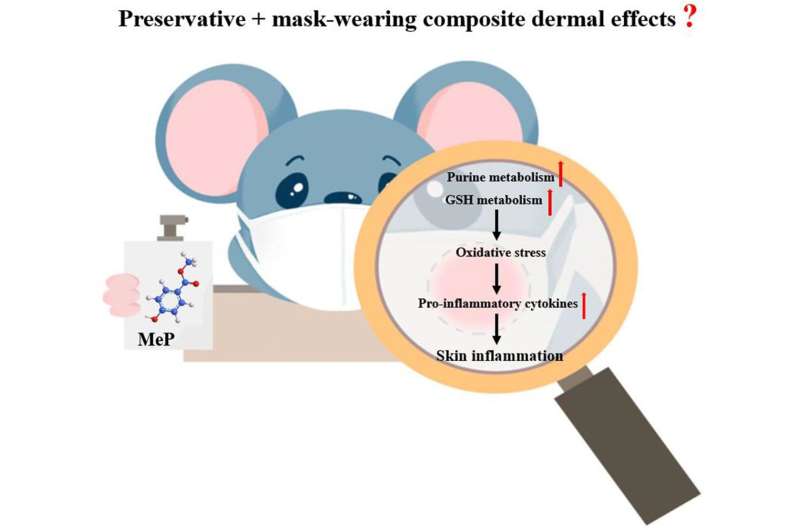This article has been reviewed according to Science X's editorial process and policies. Editors have highlighted the following attributes while ensuring the content's credibility:
fact-checked
proofread
Mask-wearing and skincare preservatives: A double challenge for skin health

The skin, our largest organ, can absorb many chemicals, including methylparaben (MeP), commonly used in cosmetics. MeP, found in 72% of tested personal care products in a Czech study, can accumulate in the skin, potentially causing adverse effects such as skin aging and oxidative stress. Additionally, mask wearing creates a hypoxic environment for facial skin, impacting skin metabolism and thickness.
A new study, published in Eco-Environment & Health on January 19, 2024, reveals the cumulative effects of mask wearing and exposure to methylparaben (MeP) on skin health, addressing a critical area of concern in the context of increased mask usage and skincare products during the COVID-19 pandemic.
Researchers have unveiled how wearing masks and using skincare products containing methylparaben—a common preservative—can together affect skin health. Through experiments on skin cells and mice, the study discovered that methylparaben can lead to skin cell damage and disrupt important skin protective mechanisms.
Additionally, the low oxygen levels caused by mask wearing exacerbate these effects, increasing the risk of skin inflammation and aging. This research sheds light on the need for reevaluating skincare routines and product formulations, especially in an era where mask-wearing has become commonplace, to ensure skin health is not compromised.
Highlights
- Hypoxia exacerbated the lipid peroxidation in normal keratinocytes caused by MeP exposure.
- Hypoxia increased the interference of MeP on purine metabolism pathway of HaCaT cell and ICR mouse.
- Hypoxia elevated MeP-induced oxidative damage and skin pro-inflammatory risk.
- Network toxicity revealed CAT, PPARG and MMP2 as the possible key genes for MeP and hypoxia synergistic effect.
The lead researcher, Lei Wang, from Nankai University, China, emphasizes the importance of understanding how everyday practices like mask-wearing and the use of common preservatives in personal care products can impact our skin's health.
By delving into the intricate effects of environmental and chemical factors on skin health, it calls for heightened vigilance among consumers and producers alike towards skincare selections, considering the ongoing global health scenario. Moreover, it advocates for a reassessment of skincare components and methods, paving the way for future investigations into the enduring impact of these elements on skin wellness.
More information: Yu Liu et al, Do wearing masks and preservatives have a combined effect on skin health?, Eco-Environment & Health (2024). DOI: 10.1016/j.eehl.2024.01.003




















